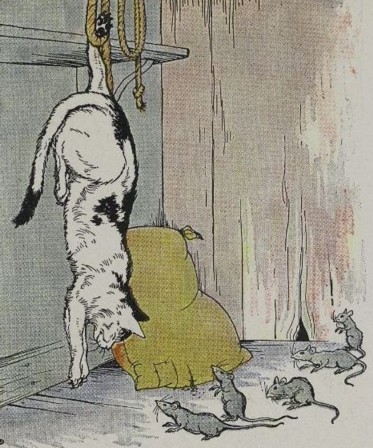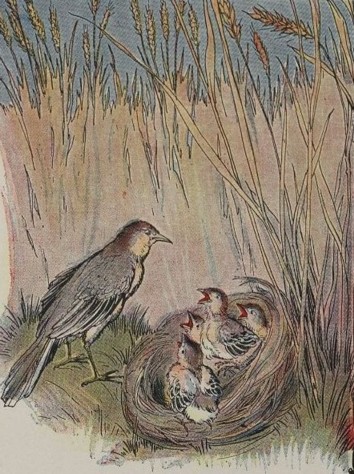| 1. watchful | /WOCH-fuhl/ |
| -giving careful attention so as to notice what is happening and be prepared for something that might happen | |
| In order to be a security staff, one must be watchful of his/her surroundings. | |
| 2. wit | /wit/ |
| -intelligence and the ability to think quickly | |
| Harry’s character has both wit and kindness. | |
| 3. timidly | /TIM-id-lee/ |
| -in a shy or nervous way | |
| The child timidly knocked on his parents’ bedroom door. | |
| 4. troop | /troop/ |
| -to walk somewhere in a large group, usually with one person behind another | |
| The musicians in the parade trooped about the large city. | |
| 5. heap | /heep/ |
| -a lot of something | |
| Kenny makes a heap of money from his own business. |

When the Mice peeped out and saw him in that position, they thought he had been hung up there in punishment for some misdeed. Very timidly at first they stuck out their heads and sniffed about carefully. But as nothing stirred, all trooped joyfully out to celebrate the death of the Cat.
Just then the Cat let go his hold, and before the Mice recovered from their surprise, he had made an end of three or four.
Now the Mice kept more strictly at home than ever. But the Cat, who was still hungry for Mice, knew more tricks than one. Rolling himself in flour until he was covered completely, he lay down in the flour bin, with one eye open for the Mice.
Sure enough, the Mice soon began to come out. To the Cat it was almost as if he already had a plump young Mouse under his claws, when an old Rat, who had had much experience with Cats and traps, and had even lost a part of his tail to pay for it, sat up at a safe distance from a hole in the wall where he lived.
“Take care!” he cried. “That may be a heap of meal, but it looks to me very much like the Cat. Whatever it is, it is wisest to keep at a safe distance.”
The wise do not let themselves be tricked a second time.
| 1. | What did the Cat do to catch one of the Mice? |
| 2. | After the Cat killed three or four of the Mice, what did the rest do? |
| 3. | What had the Old Rat lost in exchange for his experience of Cats and traps? |
| 1. | If you were one of the Mice and you saw the Cat hanging from the shelf, what would you do? |
| 2. | Do you agree that the Old Rat should share his knowledge of Cats and traps with the younger Mice? Please tell me more. |
| 3. | How would you know if someone is tricking you or not? |
| 4. | In your opinion, what is the difference between “smart” and “wise”? |
| 5. | Share an experience where you did not let yourself be tricked a second time. |
| Grammar 文法 |
Pronunciation 発音 | Vocabulary 単語 |
Comprehension 理解 |
|
|---|---|---|---|---|
 GOOD GOOD |
文法の誤りはほとんどなく、完全な文章で話すことができる | ほとんどの単語をはっきりと正しく発音することができる | 習った表現を適切に使うことができる | 文章を理解し、質問に正しく答えることができる |
 FAIR |
文法の誤りはあるが、完全な文章で話すことができる | 発音の練習が必要な言葉がいくつかある | たまにミスはあるが、習った表現を適切に使うことができる | 文章を完全に理解するのは難しく、質問に正しく答えられないときもある |
 POOR |
文章で話すのは難しく、単語だけで話すことができる | 発音の練習が必要である | 習った単語と表現を少しだけ使うことができる | 文章を理解するのは難しく、質問に答えるのは難しい |
An eBook from The Project Gutenberg.
This eBook is for the use of anyone anywhere at no cost and with almost no restrictions whatsoever. You may copy it, give it away or re-use it under the terms of the Project Gutenberg License included with this eBook or online at www.gutenberg.org




